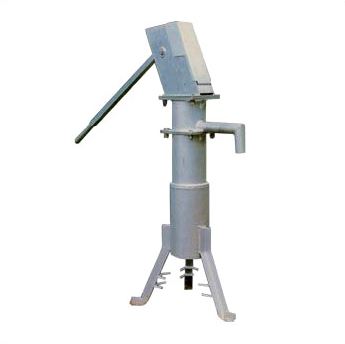MANUAL PUMP submersible (India Mark II) 15m
STD
CWATPUMEHI2
Outdated Article
Account code:
61110
HS Code:
841319
Last Updated on:
07/11/2024, 17:36:18
Former
Code(s):
CWATPUMHSUB
MANUAL PUMP submersible (India Mark)
Definition
Manually powered pump, used to draw water from wells or bore holes of a depth larger than 7 metres.
The pump raises a column of water through a delivery pipe up to the surface.
The pump is used for clinics, health posts, communities, etc...
Different models of India Mark hand pumps exist - please check the specifications of the pumps before purchasing them to make sure you purchase the correct one.
Specifications
All India Mark pumps are:
- conventional lever action hand pumps
- designed for heavy-duty use
- serving communities of 300 persons (recommendations for the number of persons per pump differ from countries!)
- VLOM hand pumps (village level operation and maintenance), implying easy local maintenance, local access to spare parts and cost effectiveness, except the India Mark II which is suitable for an extra deep well
- public domain pump defined by Indian standards and RWSN specifications
- designed to be operational for at least 1 year without maintenance
- not corrosion resistant and should not be used in areas with acid water, with pH value < 6.5
- consists of: a pump head, pump stand and a handle of galvanised steel
- equipped with the following down hole components: brass lined cast iron cylinder with a foot valve and a plunger of brass with a double nitrile rubber cup seal and pump rods of galvanised steel with threaded connectors
India Mark II, Extra Deep-well pump:
- depth: 50-80 metre
- flow rate at 60 m head: 0.45 m3/hour
- flow rate at 80 m head: 0.35m3/hour
- this pump is NOT considered a VLOM pump
- keep in mind that the column of water is getting very heavy at greater depths and can be very difficult to lift
Instructions for use
Before installing:
- before the pump is installed, the borehole should be cleaned, disinfected and protected
- the water used for priming must be free of contamination
- pumping sand will damage the pump and should be avoided
- to ensure proper installation and operation of a hand pump, proceed according to the instructions provided by the manufacturer
- for more information, refer to "Community Water Supply: The Handpump Option", UNDP & World Bank
- see also the preliminary remarks section
Maintenance:
Maintenance is key: the need to arrange maintenance and a supply of spare parts must be taken into account from the beginning.
- monthly and tri-monthly checks combined with yearly replacements significantly extend the life of the pump
- theoretical lifespans of parts:
- chain: 4 years
- valve: 4 years
- piston seals: 5 years
- handle bearings: 5 years
- pump rod: 10 years
- riser pipes: 2 years
- trained mechanic(s) are needed for repair and maintenance
- a lifting tackle and a toolkit is needed for maintenance and repair
- it is essential to train pump mechanics and provide them with suitable tools
Main criteria to choose hand pumps:
- availability of pumps and spare parts; try to use models available in the region
- pump's type of use, i.e. use in family, small community, village, clinic, ...
- the depth of the well or borehole (an increasing length of the water column requires more effort to draw water as water is heavy)
- delivery head
- desired discharge rate
- quality of water (turbidity, corrosive matter...)
- price range of pump and spare parts
- ease of maintenance routine (are any special tools required, access to maintenance, e.g. replacing seals)
- ask your technical referent if you have any doubt in choosing and/or operating hand pumps
Some restricted information has been hidden. Sign in
to see this information


![[CWATPUMSHI2C2] (hand pump India Mark II) CYLINDER, 2"½](/web/image/product.template/561194/image_256/%5BCWATPUMSHI2C2%5D%20%28hand%20pump%20India%20Mark%20II%29%20CYLINDER%2C%202%22%C2%BD?unique=77781c2)
![[CWATPUMSHI2FF] (hand pump India Mark II) FOOT VALVE](/web/image/product.template/576321/image_256/%5BCWATPUMSHI2FF%5D%20%28hand%20pump%20India%20Mark%20II%29%20FOOT%20VALVE?unique=c25db14)
![[CWATPUMSHI2P3] (hand pump India Mark II) RISER PIPE, galvanized, 1"¼, 3m](/web/image/product.template/561195/image_256/%5BCWATPUMSHI2P3%5D%20%28hand%20pump%20India%20Mark%20II%29%20RISER%20PIPE%2C%20galvanized%2C%201%22%C2%BC%2C%203m?unique=77781c2)
![[CWATPUMSHI2PB] (hand pump India Mark II) PUMP BODY](/web/image/product.template/561197/image_256/%5BCWATPUMSHI2PB%5D%20%28hand%20pump%20India%20Mark%20II%29%20PUMP%20BODY?unique=77781c2)
![[CWATPUMSHI2R3] (hand pump India Mark II) CONNECTING ROD, mild steel, 3m](/web/image/product.template/561196/image_256/%5BCWATPUMSHI2R3%5D%20%28hand%20pump%20India%20Mark%20II%29%20CONNECTING%20ROD%2C%20mild%20steel%2C%203m?unique=77781c2)
![[CWATPUMSHI2SR] (hand pump India Mark II) RUBBER SEALING RING](/web/image/product.template/561198/image_256/%5BCWATPUMSHI2SR%5D%20%28hand%20pump%20India%20Mark%20II%29%20RUBBER%20SEALING%20RING?unique=77781c2)
![[CWATPUMSHI2SW] (hand pump India Mark II) CUP WASHER, 2"½, for cylinder](/web/image/product.template/561199/image_256/%5BCWATPUMSHI2SW%5D%20%28hand%20pump%20India%20Mark%20II%29%20CUP%20WASHER%2C%202%22%C2%BD%2C%20for%20cylinder?unique=77781c2)